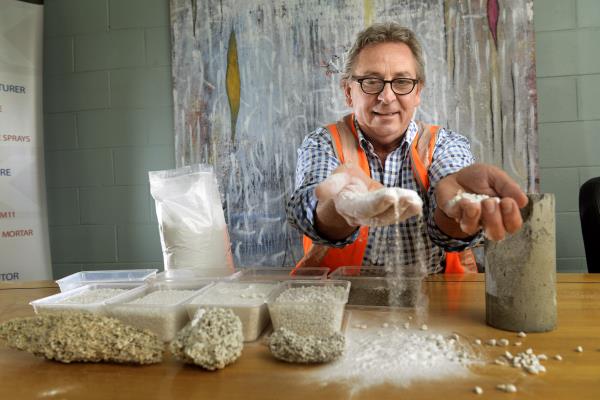By CASEY NEILL
GRAEME Raper takes a rock called perlite, crushes it and superheats it until it puffs up.
“It’s exactly like making popcorn,” he said.
In its puffed form, the mineral can filter beer and wine, whiten teeth, provide fire protection and more.
Mr Raper bought Dandenong manufacturer Exfoliators 19 years ago and is now embarking on a project that will deliver eight new jobs, increase exports to Asia and save customers time, money, energy and waste.
He last month received a $250,000 Investing in Manufacturing Technology (IMT) grant from the State Government to install a $1.2 million-plus plant.
“When I bought the business versus now, what we did in a year in terms of sales we now do in a week,” he said.
“The new plant will give us up to 100 per cent growth again.”
The equipment will produce two types of the finest grade of perlite.
“Each one of those particles is 70 microns. The average hair size, one piece of hair is 100 microns across,” Mr Raper said.
“One will be targeted as a filtering media in wine, beer and pharmaceuticals, and a filler in pharmaceuticals.
“The other will be targeted as an industrial filler in a whole range of lightweight concretes, lightweight jointing compounds, renders.
“The product’s advantage and what the plant’s about is making products of a quality and consistency that have never ever been seen in Australia before.
“And we will use about one tenth of the energy, we produce zero waste versus our competitors in the industry produce about 10 to 20 per cent wastages.”
Perlite is purchased by the tonne.
“We’re 25 per cent lighter and selling for the same price – we’ve just saved them 25 per cent,” he said.
The new product will speed up the filtration process by 20 to 30 per cent.
“They end up with at least the same quality of filtered wine – at least, and we’ve had some companies say it is better,” he said.
Mr Raper said most wine-used filter aids were recycled.
“And that’s transported by the tonne. So now their cost of transport is reduced,” he said.
The same goes for transporting industrial products made with the lighter form of perlite.
Mr Raper’s perlite is mined in Far North Queensland, where there’s a 200-plus year supply.
Heated to about 1000 degrees in a furnace it expands 10 to 20 times its original volume.
The process transforms it from a sand-like rock to a lightweight product that looks like a rice bubble to the naked eye.
“If you look at that under a microscope, each piece of that under a microscope looks very much like a piece of kitchen sponge,” Mr Raper said.
“It’s full of holes and pores and voids.”
It’s heavily used in horticulture. In soil perlite holds air and up to five times its weight in water “like a piece of kitchen sponge” and releases water when the plants need it.
In industrial fillers, render and similar products it’s lightweight, holds moisture and air, is noise absorbent and improves fire and insulation ratings.
Ships that carry LPG are insulated with perlite, and the mineral is the polishing agent in some whitening toothpastes.
Exfoliators isn’t just about perlite. It also works with another mineral called vermiculite, which comes in flat flakes.
“Whereas perlite expands spherically, vermiculate expands longitudinally,” Mr Raper said.
“We make passive fire protection sprays that get sprayed on structural steel and concrete to insulate them from fire.”
Vermiculite is used in brake linings, in soil, as a lightweight filler – and as cat litter.
“It’s very absorbent. It has massive natural odour control,” he said.
“When the cat’s finished with the product the best thing you can do with it is go and dig it into your garden.
“There’s a massive array of uses for two very simple products from Mother Nature.”







